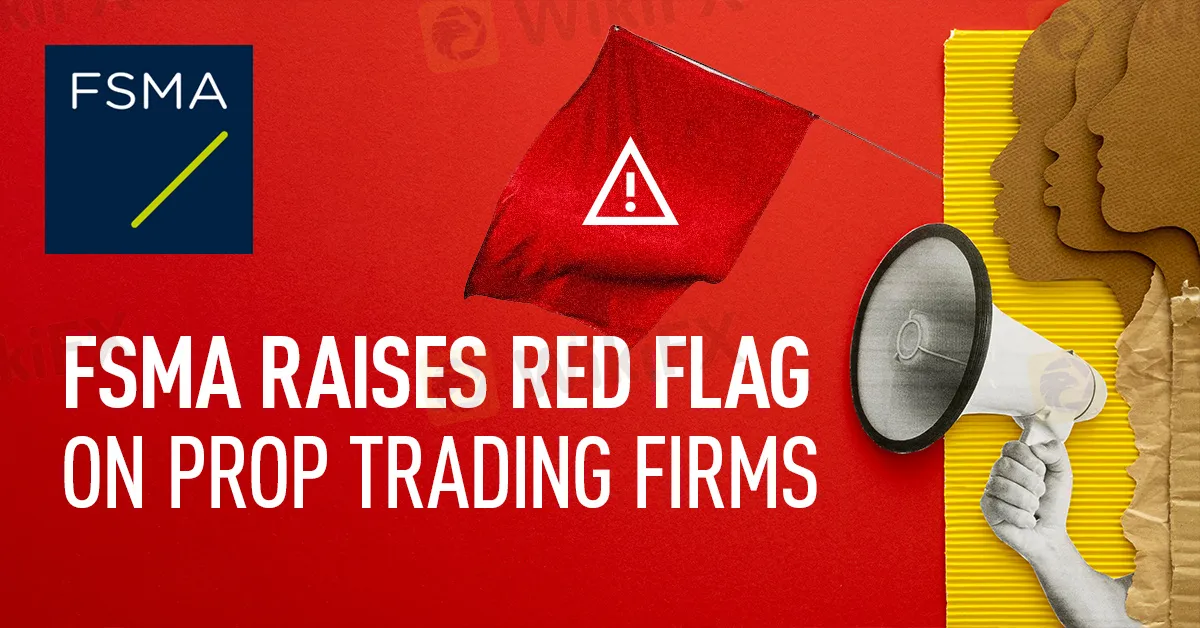简体中文
繁體中文
English
Pусский
日本語
ภาษาไทย
Tiếng Việt
Bahasa Indonesia
Español
हिन्दी
Filippiiniläinen
Français
Deutsch
Português
Türkçe
한국어
العربية
FSMA Raises Red Flag on Prop Trading Firms
Abstract:The Financial Services and Markets Authority (FSMA) issued a public warning against proprietary trading firms. There goes another hit for the proprietary trading firms!

The Financial Services and Markets Authority (FSMA) has issued a public advisory regarding the dangers associated with proprietary trading (prop trading) firms.
Prop trading firms, as elucidated by the FSMA, function by enabling consumers to trade various financial instruments such as shares, bonds, commodities, cryptocurrencies, Contracts for Difference (CFDs), and forex products without requiring the use of their own capital. However, the apparent risk-free nature of these opportunities often conceals an intricate network of financial pitfalls.
The regulator asserts that entities of this nature are currently under investigation for their questionable practices, which involve exploiting the financial inexperience of consumers and enticing them into high-risk investments.

The FSMA outlines that consumers interested in participating with prop trading firms are compelled to undergo costly and demanding courses. These courses, with a substantial price tag, aim to sift out less committed participants while generating revenue for the firms. Upon completion of these courses, consumers receive a 'certificate,' essentially a diploma issued by the firm, granting them participation in simulated trading activities. This simulated trading involves using demo accounts provided by prop trading firms, where consumers never execute real trades. Instead, the firm maintains full control over the simulated transactions, leaving consumers unaware of any potential commissions. It is also reported that many consumers find themselves caught in a cycle of paying for multiple courses without gaining access to actual trading opportunities.
The FSMA has observed a troubling surge in advertising for prop trading firms on social media platforms and the emergence of websites offering paid courses to assist consumers in navigating the challenges posed by these entities. These firms often promote trading in intricate financial instruments like CFDs and forex products, carrying significant risks for investors and potentially resulting in the complete loss of their investment.
In response to these developments, the FSMA has issued a firm caution to the public, advising against involvement with prop trading firms and their affiliated entities. The authority underscores the importance of consumers exercising utmost caution when dealing with such firms, emphasizing the inherent risks and potential financial losses involved.

Disclaimer:
The views in this article only represent the author's personal views, and do not constitute investment advice on this platform. This platform does not guarantee the accuracy, completeness and timeliness of the information in the article, and will not be liable for any loss caused by the use of or reliance on the information in the article.
Read more

Bank Negara Malaysia Flags 12 New Companies for Unauthorised Activity
Bank Negara Malaysia (BNM) has updated its Financial Consumer Alert List (FCA List) by adding 12 more entities, reinforcing its efforts to warn the public against unregulated financial schemes. Check if your broker made the list!

TradingView Brings Live Market Charts to Telegram Users with New Mini App
TradingView has launched a mini app on Telegram, making it easier for users to track market trends, check price movements, and share charts.

Georgia Man Charged in Danbury Kidnapping and Crypto Extortion Plot
Georgia man James Schwab charged in Danbury kidnapping tied to $230M crypto heist. Plot targeted couple for ransom after Miami altercation with son.

March Oil Production Declines: How Is the Market Reacting?
Oil production cuts in March are reshaping the market. Traders are closely watching OPEC+ decisions and supply disruptions, which could impact prices and future production strategies.
WikiFX Broker
Latest News
Exposing the Top 5 Scam Brokers of March 2025: A Closer Look by WikiFX
Gold Prices Climb Again – Have Investors Seized the Opportunity?
Webull Launches SMSF Investment Platform with Zero Fees
Australian Regulator Warns of Money Laundering and Fraud Risks in Crypto ATMs
The Withdrawal Trap: How Scam Brokers Lure Victims into Paying More
FCA to Investors: Think Twice Before Trusting These Brokers
Trump\s tariffs: How could they affect the UK and your money
Trump gambles it all on global tariffs he\s wanted for decades
TradingView Brings Live Market Charts to Telegram Users with New Mini App
HTFX Spreads Joy During Eid Charity Event in Jakarta
Currency Calculator







